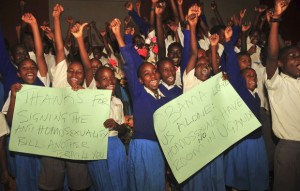
AP Photo by Stephen Wandera showing children in Uganda holding placards supporting the Anti-Homosexuality Bill and President Yoweri Museveni
Uganda has been much in the public eye recently. This comes as no surprise to those of us who for some time have watched the way the Government of Uganda has been responding to challenges to its authority. December 2012 was a catastrophe for the Government of Uganda. Donors suspended $300 Million in aid to the country because of the disappearance of $13 Million from the office of the Prime Minister. As a result the Anti-Homosexuality Bill was again raised and promised to the people of Uganda as a Christmas gift. Within civil society it has been considered for some time that this Bill was simply being used to divert attention away from many of the glaring problems a country like Uganda faces. But is this the whole story?
The signing of the Anti-Homosexuality Bill in so many ways caught us all of guard. Our own discussions with both the Swedish Embassy in Kampala and partners we work with in Uganda like the Uganda Joint Christian Council (UJCC) indicated that there was a low probability of this law being passed. But the hard reality is, that on 20th December 2013 it was passed by the Ugandan Parliament and on 24th February this year it was signed into law by President Y. Museveni.
There has been a substantial international response to the passing of this legislation. Countries have cancelled aid or realigned funding moving some towards Civil Society organizations who are not in favour of the Anti-Homosexuality bill. There are always casualties though. The first one in this engagement came on 13th of March when 87 health care professionals working in the field of HIV lost their jobs because of the realignment of funding by the USA. The World Bank has withheld or postponed $90 Million earmarked for the Ugandan Health system. All Nordic countries are relooking the way in which funding is given to Uganda. After having being upheld as a model of HIV responses Uganda has been losing ground recently. In certain areas like Kitgum and Pader in Northern Uganda HIV prevalence is climbing fast and has in places already reached 12.8%. Clearly there is a need for more rather than less intervention to bring HIV under control.
It is worth mentioning that neither the Anti-Pornography Bill in Uganda, which has been withdrawn or the Anti-Gay Marriage Bill in Nigeria which also passed and was signed into Law on 14th of January this year, have solicited the same level of opposition internationally. Both of these have had massive negative impacts. The Anti-Pornography Bill has seen women and some men stripped and publicly humiliated. The same has been true in Nigeria concerning the Anti-Gay Marriage Bill, where men suspected of being Gay have been stripped, beaten and forced to perform “gay sex” in public.
The question we face then is how to respond. It is easy to engage “from the gut” in a situation which goes completely against our belief structures. How do we engage with a partner who has not made statements against the Anti-Homosexuality Bill? Can we work in Uganda at all? Should we not withdraw completely? If we withdraw do we have any further avenues for positive engagement to try and influence attitudes? If we stay are we not supporting the exclusion of HIV and other Sexual health and reproductive services to members of the LGBT community? What of the challenging gender attitudes in Uganda, and the high rate of sexual and gender based violence? As difficult as these questions may seem to be, an authentic response needs to be informed not only by our own opinions, but also taking into account what people concerned about these issues in Uganda are saying. The Civil Society Coalition on Human Rights and Constitutional Law (CSCHRCL) in Uganda has issued a set of guidelines for National, International and regional partners working in or with Uganda. For the first time they have advocated for a redirection of funding, but state clearly that they oppose any cancelation of funding to Uganda. They believe that critical support is needed in Uganda which can build the capacity of Ugandan Civil Society to more effectively launch an internal opposition to these laws. In line with these guidelines the Church of Sweden continues our partnership with UJCC in supporting their work in reexamining gender and the way current attitudes on gender are affecting sex and sexuality generally, and looking at ways of addressing all forms of gender based violence, including the violence being experienced by people from the LGBTI community in Uganda.
The CSCHRCL also calls for positive African religious voices to speak out against the Anti-Homosexuality Bill in particular. One such voice has come from the Anglican Archbishop of Cape Town. In an article published on Sunday 16th March he eloquently defined Christian reasons for opposing the legislation, while honestly stating the challenges faced by the Anglican Church in Southern Africa on same sex marriage. http://www.iol.co.za/sundayindependent/speak-out-on-homosexual-oppression-1.1661944 A further positive and nuanced perspective can be seen in the recently published Huffington Post interview with Anglican Bishop Tengatenga of Malawi. It shows also the effects of an uninformed anti-homophobia response in parts of the USA. http://www.huffingtonpost.com/2014/03/15/james-tengatenga-anglican_n_4966753.html?utm_hp_ref=fb&src=sp&comm_ref=false#sb=3061682b=facebook What is clear is that there are no easy answers, but equally that sitting on the sidelines as a spectator is also not an option. A prayerful, informed and consultative response is demanded of us, and as Church of Sweden we commit ourselves unreservedly to this.
Lämna ett svar